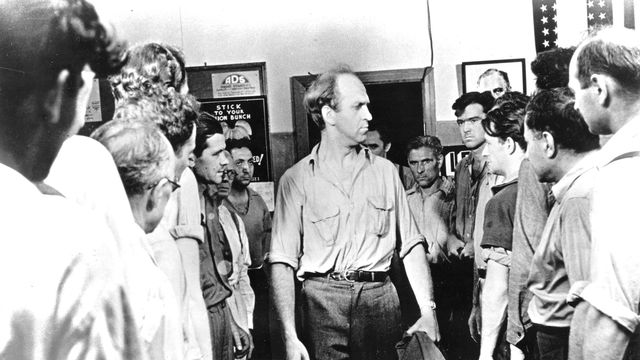
Union Activism: Native Land / The Killing Floor
- This is a past program
This program is presented by the UCLA Film & Television Archive. Part of the screening series Archive Treasures: UCLA AMIA Student Chapter Takeover!
Organized labor plays an integral role in shaping the conditions in which we work and live our lives. Native Land (1942) and The Killing Floor (1984) explore the endurance of union labor in the face of union antagonism. The existence of these films challenges the anti-labor and anti-communist trends of the 1930s and 1980s. Native Land is narrated by Paul Robeson, who was placed on the Hollywood Blacklist and brought before the House Un-American Activities Committee. The Killing Floor was produced during the Reagan administration’s union busting and cuts to public arts funding. Filming on location, in collaboration with union activists, these films tell stories of union oppression, integration, and the fight to preserve basic human rights. Together, they tell a story of organized labor’s power on and off screen.
Native Land (1942)
Based on the United States Senate’s La Follette Civil Liberties Committee hearings on labor union busting and corporate labor spying, the film became a paean to the growth of the American labor movement. Constructed from documentary and newsreel footage, as well as dramatized reenactments, the film opened commercially in May 1942 and quickly disappeared, its message of class struggle no longer in tune with the rhetoric of national unity which permeated the United States during World War II.
35mm, b&w, 89 min. Directors: Leo Hurwitz, Paul Strand. Screenwriters: Leo Hurwitz, Ben Maddow. With: Paul Robeson, Fred Johnson.
The Killing Floor (1984)
This critically acclaimed independent film is based upon the true story of a group of Black and white slaughterhouse workers who broke racial barriers by building the first interracial union in the brutal Chicago Stockyards. Damien Leake stars as Frank Custer, a young, Black sharecropper from Mississippi — one of tens of thousands of Black southerners who journeyed to the industrial north during World War I, in the hopes of racial equality. When he lands a job as a laborer on “the killing floor” of a giant Chicago meatpacking plant, he discovers an environment seething with racial antagonism.
DCP, color, 118 min. Director: Bill Duke. Screenwriter: Leslie Lee. With: Damien Leake, Alfre Woodard, Moses Gunn.
The UCLA Film & Television Archive is a division of UCLA Library, and presents its public programs in the Billy Wilder Theater at the Hammer, among other venues. For more information about the Archive, visit cinema.ucla.edu.
ATTENDING THIS PROGRAM?
Ticketing: Admission to Archive screenings at the Hammer is free. Your seat will be assigned to you when you pick up your ticket at the box office. Seats are assigned on a first come, first served basis, limit one per visitor. Box office opens one hour before the event. Questions should be directed to the Archive at programming@cinema.ucla.edu or 310-206-8013.
Member Benefit: Subject to availability, Hammer Members can choose their preferred seats and pick up tickets for one additional guest. Members receive priority ticketing until 15 minutes before the program. Learn more about membership.
Parking: Self-parking is available under the museum. Rates are $8 for the first three hours with museum validation, and $3 for each additional 20 minutes, with a $22 daily maximum. There is an $8 flat rate after 5 p.m. on weekdays, and all day on weekends.
Read our food, bag check, and photo policies.
Read our COVID-19 safety guidelines.


